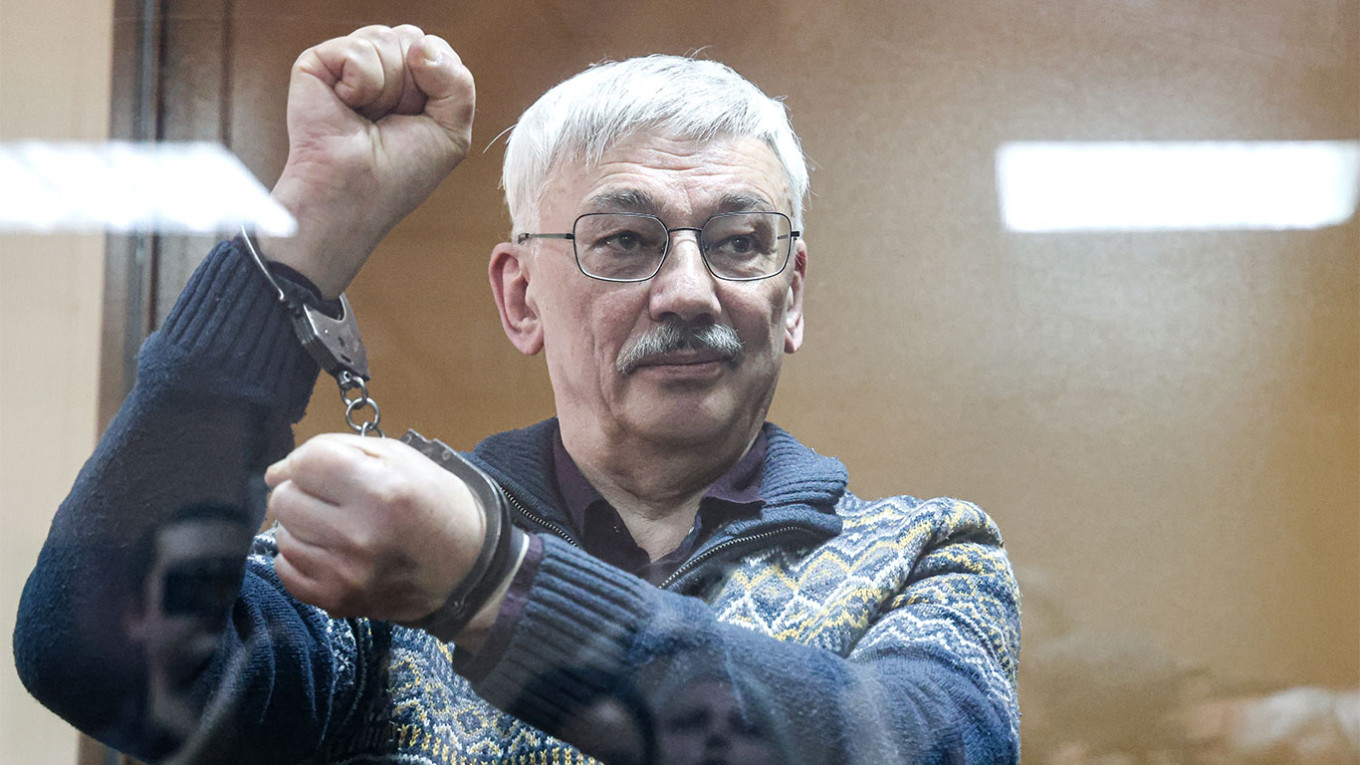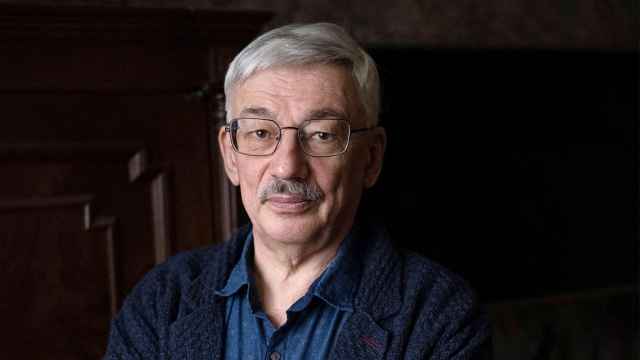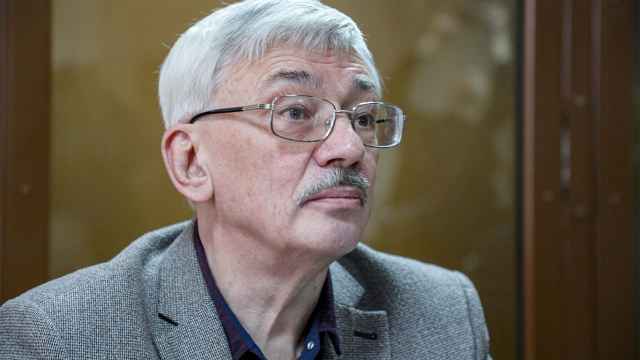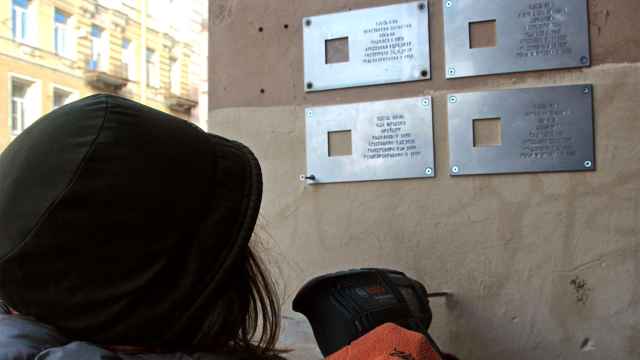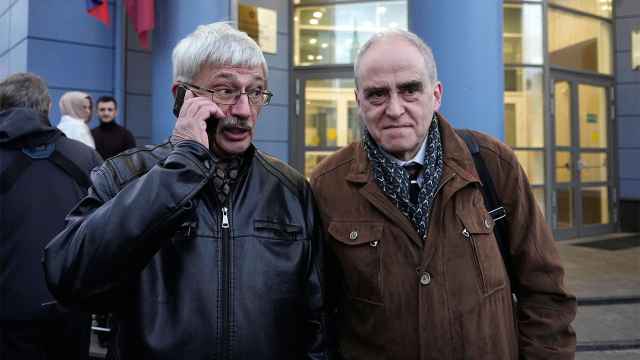One would think that after decades of seeing friends and loved ones being threatened, beaten, and murdered for simply doing their job, you would grow a thick skin. But, the sight of Oleg Orlov — whom I know as Oleg Petrovich — being handcuffed and escorted away by masked policemen hit me with a wave of anger and despair. Despite being 70, he’s barely changed since our first meeting 22 years ago, with his neat salt-and-pepper pencil mustache, slim frame, and a defiant, slightly tired expression on his face.
This seasoned, fearless human rights activist — who also happens to be a Nobel Peace Prize laureate — will be spending two and a half years in some Russian prison for “repeatedly discrediting the Russian armed forces.” But in reality, Oleg Petrovich was sentenced to jail for telling it how it is: Russia is conducting a brutal, illegal war in Ukraine, and Putinism is the new fascism.
He could have left, and many of his friends and colleagues insisted he should have done. But that’s not his style. Oleg has always been a rebel with a cause.
Born into a Soviet intelligentsia family in 1953, Oleg could have opted for a safe and respectable scientific career in biology. But in his own words, after witnessing the disastrous impact of the Soviet-Afghan war, he started to feel “suffocated” and was compelled to act.
Using a homemade copying device, he pasted anti-war leaflets all over Moscow. This was a seemingly small but dangerous act in a country that locked up its dissidents. During the perestroika years, Oleg joined the new Memorial organization, whose initial goal was to document and preserve evidence of Soviet repressions. His career naturally pivoted towards human rights activism, as the present injustices could not be ignored either.
From the late 80s onward, Oleg became a colleague and a disciple of the renowned dissident Sergey Kovalev, one of the founders of Memorial who spent 10 years in the Perm-36 Gulag for “anti-Soviet agitation and propaganda.” Together, they traveled across regions of the former Soviet Union that descended into violence, acting as independent observers during conflicts in Nagorno-Karabakh, South Ossetia, Transnistria and Tajikistan.
Then in December 1994 came the First Russian-Chechen War, which linked Oleg Petrovich to the region forever. It is thanks to him and the rest of Memorial that the most horrific war crimes committed by the Russian army were documented. This includes the infamous Samashki massacre where over 100 innocent civilians were murdered by Russian troops. The bloody script was repeated again and again, from Syria to Bucha. It was the same army acting with the same levels of brutality.
Oleg never worked for accolades and listened to pompous speeches about personal sacrifice and heroism out of politeness, hiding behind clever jokes. But time after time he acted like a true hero. During the 1995 capture of 1,200 hostages in Budennovsk, conducted under the leadership of Shamil Basayev, Oleg and Kovalev offered themselves up as voluntary hostages in exchange for captured people. During both Russo-Chechen wars, Oleg took part in negotiations for the exchange of prisoners of war, and facilitated the removal of captured Russian soldiers from the combat zone.
As the head of Memorial’s Hot Spots program, Oleg drew public attention to the abductions, torture and murders taking place in the North Caucasus. That’s how he met my mother, Natalia Estemirova. In 2000, she brought Memorial news of a horrible massacre in the Chechen village of Novye Aldy, and volunteered to go and document the testimonies. She joined Memorial, and Oleg Petrovich became a staple in our lives. He frequently stayed in our bombed-out apartment in Grozny, where he taught me how to make paper planes, and showed me around Memorial’s offices in Moscow.
Just like my mum, Oleg believed that if you could save even one human life, it was worth talking to anyone and even working within the system. They were both true humanitarians, and perhaps too idealistic for their own good. But it never meant bending your principles or showing weakness.
Following the murder of my mother on July 15, 2009, which remains unsolved to this day, Oleg Petrovich immediately placed responsibility on the head of Chechen leader Ramzan Kadyrov. While other men cowered in fear, he once again called it for what it was. Kadyrov sued him for defamation but lost. His victory still feels miraculous because Russian courts rarely end up on the side of justice. In 2018, he stood beside another Memorial colleague, Oyub Titiev, who was sentenced to two years in Chechen prison on fabricated drug possession charges. Oleg always stood by his colleagues and when it was his turn to be placed in the dock, we stood by him too.
For Oleg, the Russian-Ukraine war started back in 2014, with the annexation of Crimea. Memorial went on multiple missions to Eastern Ukraine and worked closely with Ukrainian activists, including the Center for Civil Liberties, to document human rights violations. Following the full-scale invasion of Ukraine, Oleg criticized Russian authorities for waging an illegal war and increasing the level of repression within the country, for which he was put on trial.
There was already little space for dissent in Russia, and what remained has become virtually non-existent. Oleg’s first sentence in 2023 resulted in a 150,000 ruble ($1,500) fine. The lack of a prison sentence was deemed too lenient by the prosecution and a re-trial followed. This time, we expected a harsher outcome. So did Oleg Petrovich. In the courtroom, he let his lawyer Ekaterina Tertukhina do the talking, while he read Franz Kafka’s “The Trial,” a novel that eerily mirrors his own incomprehensibly absurd experience.
He chose to speak only when delivering his powerful closing remarks once again decrying the “suffocation of freedom” in Russia — the same suffocation he felt as a young man during the dying years of the Soviet Empire. Would he have done anything differently, had he known the length of his sentence? I very much doubt it.
There has been little good news this February, from the second anniversary of Russia’s full-scale invasion of Ukraine and the loss of Avdiivka, to Navalny’s murder in a Siberian penal colony and the sentencing of Oleg Petrovich. These times feel so dark that even the thought of a distant sunrise seems exhausting and untrue. How can you go on when it feels like you are fighting on the losing side? It is so easy to dominate and destroy when you have removed your conscience like an appendage.
But Oleg Petrovich would say giving in to the darkness is the worst thing one can do. So, I have started thinking about what I will write when I send him a letter, and I would encourage everyone reading this to do the same.
The last time we saw each other was in a small restaurant in the heart of Lisbon. As always, he refused to talk in detail about his impending court case. Instead, he asked me a thousand questions about my recently broken leg — not to distract himself, but because at that moment it was the most important issue for him. I asked him to come back in the summer when my leg was better so we could go fishing in the sea. I’m hopeless at it, but I know he could teach me a few tricks.
Perhaps that’s what I’ll write to him about. Not about dramatic heroism and sacrifice. Instead, I'll tell him I’m expecting to meet him by the Atlantic Ocean in precisely two and a half years when he is free, waiting for him with two fishing rods in my hands.
A Message from The Moscow Times:
Dear readers,
We are facing unprecedented challenges. Russia's Prosecutor General's Office has designated The Moscow Times as an "undesirable" organization, criminalizing our work and putting our staff at risk of prosecution. This follows our earlier unjust labeling as a "foreign agent."
These actions are direct attempts to silence independent journalism in Russia. The authorities claim our work "discredits the decisions of the Russian leadership." We see things differently: we strive to provide accurate, unbiased reporting on Russia.
We, the journalists of The Moscow Times, refuse to be silenced. But to continue our work, we need your help.
Your support, no matter how small, makes a world of difference. If you can, please support us monthly starting from just $2. It's quick to set up, and every contribution makes a significant impact.
By supporting The Moscow Times, you're defending open, independent journalism in the face of repression. Thank you for standing with us.
Remind me later.



